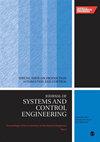A finite-time path-tracking control algorithm for nonholonomic mobile robots with unknown dynamics and subject to wheel slippage/skid disturbances
IF 1.4
4区 计算机科学
Q4 AUTOMATION & CONTROL SYSTEMS
Proceedings of the Institution of Mechanical Engineers, Part I: Journal of Systems and Control Engineering
Pub Date : 2024-03-14
DOI:10.1177/09596518241233319
引用次数: 0
Abstract
Path planning and tracking control are two performance-critical tasks for wheeled mobile robots, particularly when nonholonomic constraints are imposed on robots in dynamically uncertain conditions. Accomplishing certain performance and safety considerations related to path-tracking, such as global stability, transient performance, and smooth finite-time convergence, becomes more difficult for nonholonomic robots. This paper is concerned with proposing a new adaptive robust finite-time tracking control approach for a large class of differential drive autonomous nonholonomic wheeled mobile robots (NWMRs) that are subject to structured uncertainties and extraneous disturbances with fully unknown dynamics. For this purpose, nonlinear kinodynamics of a type of rear-wheel drive NWMRs are developed by incorporating the skid/slippage constituents of the wheel motion. Then, a path-tracking controller is proposed using a continuous finite-time adaptive integral sliding mode control coupled with an integral backstepping approach (FTAISM-IBC). For the adaptive controller design, the entire nonlinear dynamics of the robot, including nonlinear vector functions and control gain functions, together with extraneous disturbances, are estimated by leveraging the universal approximation capabilities of radial basis neural networks (RBFNNs). The finite-time stability proof is presented by utilizing the Lyapunov stability theorem. Furthermore, the adaptive gains are derived to ensure the finite-time stability of the system subject to unknown functions, parametric variations, and unknown but bounded disturbances. Finally, the effectiveness of the proposed controller is evaluated through simulations in terms of several key performance indicators against several reported studies.具有未知动力学并受车轮打滑/防滑干扰的非全局性移动机器人的有限时间路径跟踪控制算法
路径规划和跟踪控制是轮式移动机器人的两项性能关键任务,尤其是当机器人在动态不确定条件下受到非人体工学约束时。对于非全自主机器人来说,实现与路径跟踪相关的某些性能和安全考虑因素(如全局稳定性、瞬态性能和平稳的有限时间收敛)变得更加困难。本文针对一大类差分驱动自主非全自主轮式移动机器人(NWMR)提出了一种新的自适应鲁棒有限时间跟踪控制方法,这些机器人受到结构不确定性和外来干扰的影响,具有完全未知的动力学特性。为此,通过将车轮运动的打滑/滑动成分纳入其中,开发了一种后轮驱动 NWMR 的非线性动力学。然后,利用连续有限时间自适应积分滑模控制与积分反步进方法(FTAISM-IBC),提出了一种路径跟踪控制器。在自适应控制器设计中,利用径向基神经网络(RBFNN)的通用近似能力,估算了机器人的整个非线性动态,包括非线性矢量函数和控制增益函数,以及外来干扰。利用 Lyapunov 稳定性定理提出了有限时间稳定性证明。此外,还推导出了自适应增益,以确保系统在未知函数、参数变化和未知但有界干扰条件下的有限时间稳定性。最后,根据几项关键性能指标,通过仿真评估了所提控制器的有效性,并与几项已报道的研究进行了对比。
本文章由计算机程序翻译,如有差异,请以英文原文为准。
求助全文
约1分钟内获得全文
求助全文
来源期刊

CiteScore
3.50
自引率
18.80%
发文量
99
审稿时长
4.2 months
期刊介绍:
Systems and control studies provide a unifying framework for a wide range of engineering disciplines and industrial applications. The Journal of Systems and Control Engineering refleSystems and control studies provide a unifying framework for a wide range of engineering disciplines and industrial applications. The Journal of Systems and Control Engineering reflects this diversity by giving prominence to experimental application and industrial studies.
"It is clear from the feedback we receive that the Journal is now recognised as one of the leaders in its field. We are particularly interested in highlighting experimental applications and industrial studies, but also new theoretical developments which are likely to provide the foundation for future applications. In 2009, we launched a new Series of "Forward Look" papers written by leading researchers and practitioners. These short articles are intended to be provocative and help to set the agenda for future developments. We continue to strive for fast decision times and minimum delays in the production processes." Professor Cliff Burrows - University of Bath, UK
This journal is a member of the Committee on Publication Ethics (COPE).cts this diversity by giving prominence to experimental application and industrial studies.
 求助内容:
求助内容: 应助结果提醒方式:
应助结果提醒方式:


